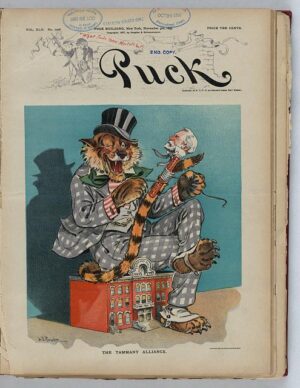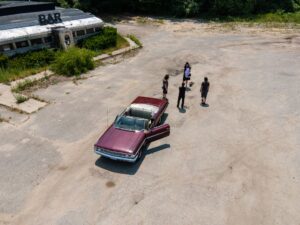
What follows is full of rationalization, obfuscation, and delay – and finally a confession. Bear with me – shaming oneself is never an easy task.
In the second grade I changed schools. This brought big changes. First, I no longer had to ride the school bus. The new elementary school, Burton Grove, was an easy walk from my house though I was only 7. I could even go home every day for lunch.
After that 1st grade year – when I lived in the country as part of a one car family where my mother didn’t drive – being “in town” where I could walk to school and to the Boys’ Club that formed the crux of my existence was as if I had been heard crying in the wilderness and saved. Life was good.
But this glorious transition was not ideal. It also had its down side. I was the “new kid,” That meant I had to establish myself somehow. So there were a couple of school yard fights. I acquitted myself adequately. But even that did not give me a “place” – a role within the larger classroom and school so that my peers could identify me. Such is the social ecology of elementary school. It was important to know who I was – and, perhaps, even more important for others to know.
After the triumph I recounted earlier in “Yertl,” I had excelled in school. I became, if not the best of the Red Bird readers, one of the best. I took to writing (well, copying letters from the board into my lined tablet) with gusto and facility. All the other academic tasks of 1st grade (such as they were then) I performed near the top of my class. I was on my way to becoming a scholar.
I continued this success at my new school, soon establishing myself as one of the quickest learners in my class. It didn’t take long before the guys in my class called me “the brain.”
I had my place.
* * * * * * * * * * * * * * *
Having a place in the school social ecology is no guarantee that life will be easy. Once you’ve established yourself – as jock, as clown, as brain – you have your place. But you also have all the “responsibilities appertaining thereto,” as academic ceremonies are fond of noting. There is pressure attendant to any role, and nowhere is this more evident than in that social experiment we call public education where development of social skills is as important a function as is development of academic abilities.
If you’re a typical kid and you have your place, it’s highly likely you’ll do whatever you think is needed to maintain that sense of the same – and of self.
Here’s what I did.
Sometime in February of that 2nd grade year, I was out of school for a couple of days. I don’t think it was anything serious, just a cold or something equally trivial. This happened on a Thursday-Friday, so I ended up having four days away from school.
Four days off from school is a long time to a seven year old boy, and I was a typical seven year old boy in many ways. I spent my time watching TV from my pallet on the sofa, reading, playing with my miniature army men. What I didn’t do was pay any attention to the homework assignments brought by my house Thursday and Friday afternoon by a neighbor girl from my class.
I was, as I’ve boasted earlier, a bright student. I knew I could easily complete the reading assignments and math worksheets in the stack of books beside the sofa. And I did – in one scholarly blitzkrieg late Sunday afternoon I knocked the work out.
Ready for the next day. Good old Monday.
So I thought.
But I’d dismissed and then forgotten the list of spelling words attached to a worksheet on homonyms. I wanted to be through so I could watch Mr. Ed. So I ignored the spelling words with a mental “I’ll review those later.” But I didn’t.
Monday dawned cold and clear. I was well and walked with friends to school – including my friend Sherry who’d dropped off the homework. “Did you get that work I brought home to you done, Charlie?” she asked.
“Of course,” I replied, as proudly blasé as any 2nd grader can be.
But as the Scriptures tell us, pride goeth before a fall.
* * * * * * * * *
Class began with the usual ceremony: Mrs. Field called the roll, we recited the Pledge of Allegiance, Mrs. Field read a Bible verse (this was a long time ago, kids), and Dr, Norman, our principal, made announcements over the intercom.
Then, as Macbeth would say, came my fit.
“Time for our spelling test, class. Take one sheet from your tablets and clear your desks and put away everything else.”
Terror seized me. I hadn’t reviewed my list of spelling words. Disaster loomed. I had never made less than a perfect score – 100 – on any spelling test. Being great at schoolwork was my identity. I was “the brain.” Doom opened its dark jaws and I peered into an abyss.
With unsteady hands I tore my sheet of paper from my tablet and cleared my desk. In the next row of desks over sat Deborah. She was also a “brain” – though as a girl it was less of a differentiating quality for her in the social hierarchy of 2nd grade. I note this because it will prove important shortly.
Mrs. Field began to call out the words on the list. “House. Work. Book. Read….”
And suddenly it dawned on me. I could spell these words! Quickly I wrote them down on my paper. The clouds lifted. Despite my irresponsibility, I could succeed. I was, indeed, a brain…maybe even a genius….
More words followed; there were always ten words in each spelling list. I made it through nine without incident.
But then Mrs. Field said, “And the last word is…does.”
I drew a blank. I knew the word started with “d.” Beyond that, I was lost. All that came to me was the name of a detergent popular at that time – DUZ.
It was wrong. I knew it was wrong. I was beside myself with panic and disgust. I would no longer be “the brain.” I would just be some kid who missed spelling words.
Just at that moment, in the nadir of despair, there was a noise in the hall. Mrs. Field moved to the door to close it, but as she did, every student looked towards the door to see what the commotion was.
Including Deborah.
And as Deborah craned to see what was going on in the hall, her arm moved away from her paper where she’d kept her spelling list hidden as we were encouraged to do to defend against “wandering eyes” as Mrs. Field termed them.
My eyes wandered. I saw her list of spelling words – and her correct spelling: “d-o-e-s.”
Of course! That was it. D-O-E-S. How silly of me….
Then came my moral crisis.
I looked down at my own paper as Mrs. Field told the class to refocus on the test and to avoid letting our eyes wander. “Has everyone finished?” she asked.
Reader, I would like to tell you that my better angels guided me to accept my fate and miss the word and break my string of perfect scores. But I didn’t. I quickly, clumsily erased “duz” and wrote the correctly spelled word.
Mrs. Field called for papers to be passed forward, reminding us to put our names on our papers. As I wrote my name at the top of my paper, I felt a set of eyes on me, I glanced across and Deborah eyed me suspiciously.
“What?” I whispered.
“You cheated,” she hissed.
Flustered, I was about to admit my treachery when Fat Joe who sat in front of me pivoted in his seat and said, “Papers.”
At almost the same moment, Sherry, my neighbor, who sat behind me began swatting me on the back with the papers coming from the back of the row. I turned, took the papers from her, added mine to the group, and passed them to Joe. By then I’d hardened myself and I turned to Deborah. “I don’t need to cheat,” I said as smugly as I could make myself. “I’m smart.”
She glared. “You got a word from my paper when we were looking into the hall.”
“Nope,” I replied, having lapsed into the cool persona that has served me most of childhood and all of my adult life. “Why would I want to miss words? That’s what I’d do if I copied off your test.”
“No talking until the test papers are in my hands!” Mrs. Field intoned in a commanding voice.
I smirked at Deborah. She stuck her tongue out at me. Mrs. Field began talking about our math worksheets and the day moved on.
* * * * * * * * *
I didn’t start to feel bad until Mrs. Field handed back our tests on the following Wednesday. She had circled the “correction” on my paper and written “Good job fixing this!”
I sat at my desk and looked at the paper with the red circled proof of my cheating and Mrs. Field’s commendation of my crime. I’d just decided to tear the evidence up and toss it into the waste basket when Mrs. Field announced that we should take all our work for that week home and have a parent sign it. To that end we spent the next part of the day making folders out of brightly colored construction paper.
As we worked Mrs. Field gave us permission to talk. All about me boys and girls chattered. I worked silently, solemnly. Suddenly Mrs. Field stood by my desk. “Are you feeling all right, Charlie?” she asked gently.
I hesitated, then said softly, “I don’t know.”
“Do you need to go to the restroom?”
From nowhere a plan formed instantly in my mind. “Yes, ma’am,” I said trying to look as if I might puke.
“Well, you go ahead. If you don’t come back quickly I’ll send someone to check on you.”
“Yes ma’am.”
She walked away from me towards the back of the room. I watched her turn to speak to other students, then fished the spelling test from under my construction project. I folded it quickly and stuffed it into my pocket. On my way from the room I stopped by Mrs. Field’s desk and pick up the large blue wooden key that was my passport to and from the restroom.
* * * * * * * * *
The boy’s restroom was down a flight of stairs at the end of a long hallway that passed several other classrooms. I walked as fast as I dared. When I got to the boy’s room there was another kid there, so I loitered for a couple of minutes until he left. As soon as the big door clapped shut I darted into one of the stalls and took out the spelling test. I looked at it one last time.
Then, with tears in my eyes, I tore it into pieces and threw the shreds into the toilet. I flushed them away, then turned and sat down on the seat. I must have sat there a long time staring at the tile floor and thinking. Suddenly the restroom door flung open and I heard Fat Joe yell, “Hey, Charlie, you still in here?”
In my best “sick voice” I called back weakly, “Yeah, I’m still here, Joe.”
“Mrs. Field says she’ll call your mom if you need her to,” he yelled.
I stood up. “No, I’m okay now, I think,” I said and came out of the stall. “You go ahead back. I’ll wash my hands and be right along.”
“Okay.” He turned on his heel and took off, the big restroom door closing behind him.
I went to the sink and turned on the water and stuck my hands under. I reached up to put get some soap from the dispenser and saw my reflection in the mirror. I shuddered slightly. I didn’t seem to know that guy.
When Mrs. Field asked me about the missing spelling test I told her it had gotten torn up and I had just thrown the pieces away because I didn’t know what to do. That was at least partly true.
* * * * * * * * *
I never cheated in school again. Somehow I worked through my guilt and managed to forget about the spelling test and my shame until a day in my senior year of high school when we were reading Coleridge’s “The Rime of the Ancient Mariner.” In Part VII of the poem are the following lines:
Since then, at an uncertain hour,
That agony returns:
And till my ghastly tale is told,
The heart within me burns.
My tale is told, too. May we all rise wiser, if a little sadder, tomorrow morn.
###
This is from my latest book of stories THE WONDERFUL LAND OF EDEN (in progress).




